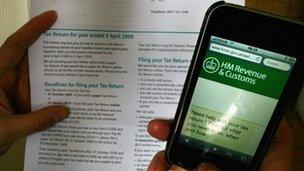Tax avoidance schemes 'costs UK billions in lost revenue'
- Published

HMRC says it has been successful in the majority of cases where it has taken legal action
The inability of HM Revenue and Customs (HMRC) to properly curb aggressive tax avoidance schemes is costing the UK billions of pounds, a report suggests.
The National Audit Office said HMRC was dealing with a backlog of 41,000 cases involving individuals and small companies, with up to £10.2bn at stake.
The spending watchdog said tackling avoidance, which is not illegal, was difficult but HMRC must do better.
HMRC said it had successfully challenged 40 schemes in two years.
The coalition government has made cracking down on tax avoidance and evasion one of its key priorities as part of efforts to boost the exchequer and reduce the deficit.
But according to the NAO, between 2004 and 2011 about 2,300 avoidance schemes were disclosed to the tax authorities, with more than 100 new schemes emerging in each of the past four years.
Inflated losses
It is currently estimated there are 30,000 users of what are known as employment intermediary schemes and partnership loss schemes - where partnerships that make a loss can shelter their other income from tax.
In such cases the loss is artificially inflated - through the use of "circular loans" or deferred expenditure which is never incurred - to exceed the amount actually invested in the partnership.
Although HMRC has sought to tackle the practice by taking enforcement action in a few "lead" cases, such investigations can take many years to resolve and the rulings cannot always be applied successfully elsewhere.
Since April 2010, litigation has been opened in 110 avoidance cases.
HMRC has been successful in the vast majority where judgements have been reached but the NAO said there was no evidence that this level of litigation was proving an effective deterrent.
"HMRC must push harder to find an effective way to tackle the promoters and users of the most aggressive tax avoidance schemes," said Amyas Morse, the organisation's director.
"It is inherently difficult to stop tax avoidance as it is not illegal. But HMRC needs to demonstrate how it is going to reduce the 41,000 avoidance cases it currently has open."
The NAO said such tax avoidance schemes were being "mass-marketed" - often by small specialist tax advisers whose business model relies on helping their clients to avoid paying tax.
Since 2004, promoters who design and sell such schemes have been required to notify the authorities but the watchdog said this had had little impact on the overall scale of tax avoidance activity.
"This changed the shape of the market, but has not prevented some promoters from continuing to sell highly contrived schemes to large numbers of taxpayers, depriving public finances of billions of pounds."
'Playing catch-up'
Margaret Hodge, chairwoman of the Commons Public Accounts Committee which oversees the work of the NAO, said the authorities were having to "play catch-up" as new avoidance methods were conceived.
Amazon's Andrew Cecil was condemned by MPs for failing to answer questions
"People who pay their taxes promptly and in full will be dismayed to discover that the enormous level of tax avoidance taking place is overwhelming HMRC's efforts to combat it," she said.
"HMRC must step up its enforcement activity to clamp down on promoters of schemes who fail to disclose properly. Fines are currently being applied in far too few cases to serve as a meaningful deterrent."
HMRC said its successful challenges through the courts had disrupted the avoidance industry and protected about £4bn.
However, a spokeswoman added: "But as the avoidance landscape changes, so must our approach. The Government is building on [the disclosure of tax avoidance schemes] to give HMRC stronger powers to obtain information.
"These, together with the introduction of an anti-abuse rule in 2013 will further strengthen our anti avoidance work."
For Labour, Catherine McKinnell, shadow Treasury minister, said: "Despite the government's rhetoric on tax avoidance they are consistently failing to deliver.
"Ministers need to get a grip. Cuts to HMRC that go too far and are seeing over 10,000 additional job losses will prove to be a false economy if they hamper their ability to collect billions of pounds in avoided tax."
- Published20 August 2012
- Published8 August 2012